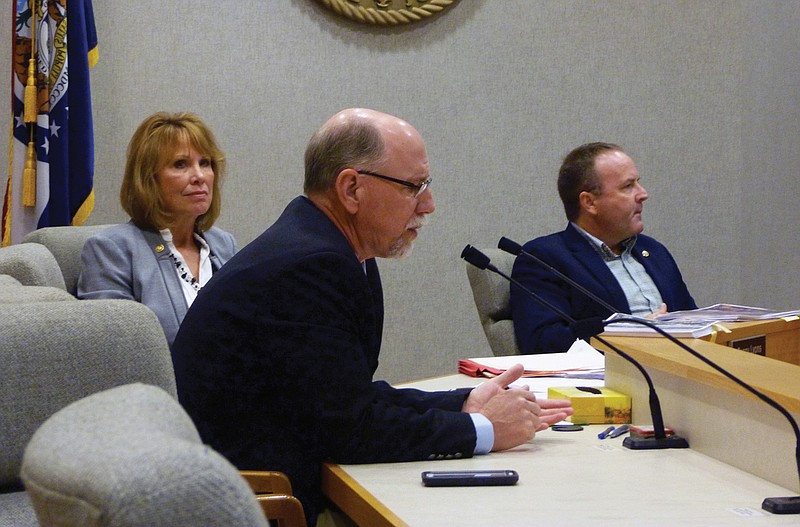OSAGE BEACH, Mo. - Lake of the Ozarks area residents lobbied Missouri legislators for stricter fire codes for multi-family dwellings, electrical inspections of boat docks and more controls over boats that create large wakes during a three-hour town hall meeting.
The discussion came during Wednesday's meeting between the legislators and a standing-room only crowd at Osage Beach City Hall.
State Reps. Diane Franklin, R-Camdenton, Rocky Miller, R-Tuscumbia, and David Wood, R-Gravois Mills, led the discussion; participants included representatives from Ameren Missouri, the Osage Beach Fire Protection District, the Marine Dealers Association, the Missouri Highway Patrol, small-business owners and members of the public.
Electrical wiring on docks
Angela Anderson, the mother of two children who were electrocuted while swimming near a boat dock that was not sufficiently grounded in the lake's Gravois Arm, spoke Wednesday of the need for stricter rules for docks.
Osage Beach Fire Protection District Chief Jeff Dorhaur said his department has implemented stricter rules governing the inspection of boat dock wiring. He said other area fire districts have done the same.
Jeff Green, Ameren Missouri shoreline manager, said 20,000 of the approximately 25,000 boat docks on the lake are in fire districts that do electrical inspections; the remaining docks are in areas where electrical codes are unenforceable. He said Ameren requires each dock's wiring pass a safety inspection before a dock permit is issued. But there is no way to ensure the wiring is kept up to code once that permit is in place, he said.
He added Ameren is amenable to working with local fire districts and the state Legislature in a law that would require mandatory, periodic inspections of a dock's electrical wiring.
Fire safety
An Aug. 4 condominium fire, in which four children died of smoke inhalation, showed the need for stricter fire codes, the panel was told Wednesday.
The fire began in a balcony area just outside the apartment where the children were sleeping. The complex was built in the early 1970s, before sprinklers were required in multi-unit buildings, and it did not have an automatic fire-suppression system.
Dorhauer said there are 94 similar multi-family dwellings in the Lake area and at least 50 of them have no sprinkler systems. Many of those complexes, he said, were built before fire codes were put in place; others are in rural areas where the only water supply is an in-ground well that does not have sufficient capacity to support a fire-suppression system.
An uncle of two of the children who died in the August fire told the panel the installation of sprinkler systems may be cost prohibitive in some older condominium complexes, but he would still like to see the Legislature strengthen fire codes for multi-family buildings.
Dorhauer said he has formed a committee that is exploring how to strengthen fire codes; he invited legislators and the public to attend the committee's meetings.
Large wakes on lake
Wakes by large boats on the lake are damaging docks and other vessels, as well as creating safety issues, the legislators were told.
Mike Kenagy, spokesman for the Marine Dealers Association, said: "The marine dealers are willing to work with the Highway Patrol and the Legislature in creating some kind of speed limit on the lake in those areas where it is needed to ensure safe boating."
Highway Patrol Capt. Matt Walz said wakes, especially those created by large boats, are responsible for a large majority of the boating accidents. But he said his officers can only enforce speed limits in areas where no wake buoys have been posted.
Under state law, Walz said boats traveling at high speeds cannot come within 100 feet of a dock. But that distance is not enough to prevent the damage done by the boat's wake. Furthermore, he said, no law prevents a boat traveling at a high speed and in the "center" of the lake from creating a wake that can severely rock or even swamp a nearby smaller vessel.
Walz said the worst wakes are created by boats weighing more than 50,000 pounds. But he said his officers cannot stop a boat simply because it displaces a large amount of water and creates a wake by traveling at a high rate of speed.
"We can't enforce a law that doesn't exist," he said.
The legislators asked the Patrol to provide some statistics on the number of injury accidents that are caused by the wakes from passing boats on an annual basis.


